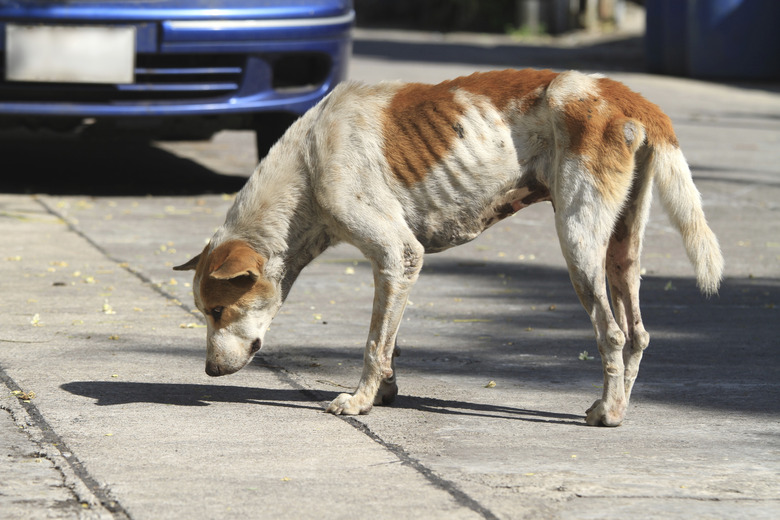How To Treat A Malnourished Dog
Malnourishment is the condition caused by the lack of proper nutrients in a dog's diet. A dog may become malnourished if he subsists on a diet that isn't balanced, but many cases of malnourishment stem from poor conditions or a lack of food. The right food in the right amounts can ensure that malnourished dogs regain their strength and eventually attain a healthy weight.
Symptoms of Malnourishment
Symptoms of Malnourishment
When a dog is truly starving, his body utilizes glucose harvested from his own fat and muscle tissue. The dog's metabolism slows down in an attempt to slow the wasting of the muscle tissue and chemicals called ketones are released by the liver to conserve the glucose that red blood cells and kidney tissues need to function, according to PetMD. When malnutrition is due to improper diet, the dog may be underweight, develop hives and rashes, have skin allergies or develop hot spots.
Visiting the Veterinarian
Visiting the Veterinarian
Severely emaciated dogs should be examined by the veterinarian, who can prescribe a treatment plan. The veterinarian will first perform a thorough examination of the dog, checking his temperature and estimating a healthy weight for him. The vet will check the dog's mouth for broken teeth or sharp bone fragments and ensure that the tongue is in tact. The dog also will be examined for evidence of parasite infestation and dehydration. If no major health issues are detected, the veterinarian will prescribe a diet designed to bring the dog's digestive system slowly back to good health. Vomiting or loose stools are common during the first few days, according to PetMD, but the veterinarian should be notified if the dog passes blood in the stool or vomit.
Feeding for Health
Feeding for Health
The veterinarian will prescribe a high-fat, low-carbohydrate diet for the recovering dog, usually a quality puppy chow or growth food that is easily digested. A vitamin supplement including omega-3 and -6, amino acids, arginine and glutamine will support the dog's recovery. To avoid refeeding syndrome, dogs should be given only small meals during the first three to seven days, according to the Koret Shelter Medicine Program. The dog's food intake should be based on his estimated weight, and divided into four portions and served six hours apart. If the dog's appetite does not begin to return after 24 hours, contact your veterinarian, who will give you advice on assisted feeding.
Malnourished Dog Care
Malnourished Dog Care
According to the Koret Shelter Medicine Program at UC Davis, animals recovering from starvation have impaired immune systems, and should be kept separate from other pets. Dog caregivers can keep a careful record of the dog's appetite and weight gain, particularly during the initial refeeding phase. A malnourished dog lacks the insulating fat that helps keep his body warm, so he should be housed in a warm environment until he recovers.
Always check with your veterinarian before changing your pet's diet, medication, or physical activity routines. This information is not a substitute for a vet's opinion.
References
- PetMD: Caring for an Emaciated Dog
- Washington State University: Feeding a Previously Starved Dog
- PetMD: Feeding the Starving Dog
- Koret Shelter Medicine Program: Starvation and Re-Feeding Animals
- Wisconsin Federated Humane Society: Feeding Skinny Animals: Helpful or Harmful?
- Dog Channel: The Price of Poor Nutrition
